NURS 8014: Essay Analyzing Migrant Health Professionals and Healthcare
VerifiedAdded on 2023/01/10
|7
|2070
|43
Essay
AI Summary
This essay delves into the increasing international migration of health professionals, examining its impact on both developed and developing countries. It highlights the push and pull factors influencing health workers' decisions to migrate, including working conditions, salaries, and opportunities for professional development. The essay discusses the challenges of brain drain in developing nations, where skilled health professionals leave for better opportunities abroad, and the resulting shortages in healthcare. It also explores the role of globalization and economic changes in shaping migration patterns and the need for governments to create attractive working conditions to retain healthcare workers. Furthermore, the essay analyzes the financial implications of remittances and the importance of addressing social determinants of health to achieve sustainable development in healthcare. The essay emphasizes the need for policy interventions to manage migration effectively and ensure equitable access to healthcare globally, considering the perspectives of both sending and receiving countries, and addressing the concerns of labor unions and other stakeholders.
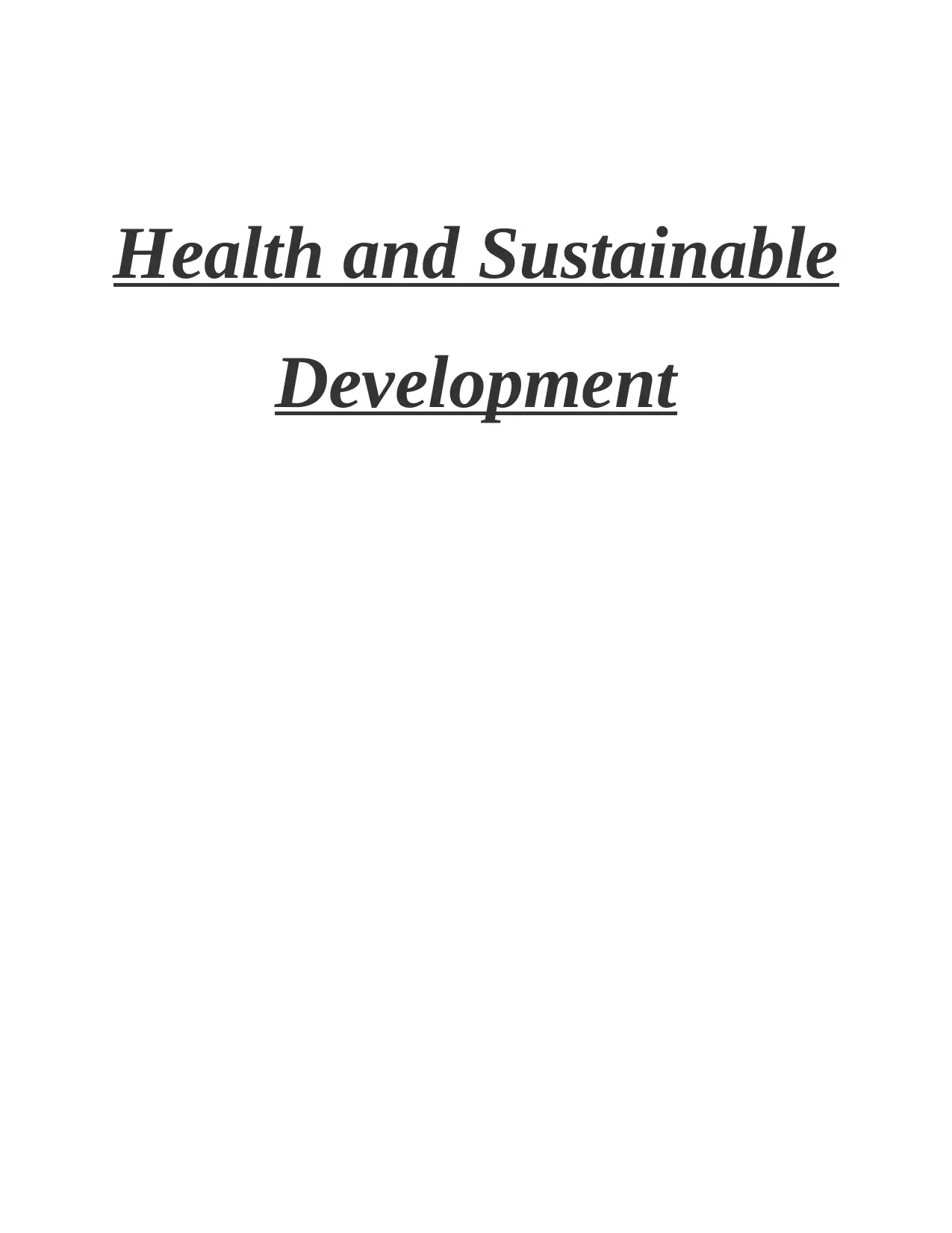
Health and Sustainable
Development
Development
Paraphrase This Document
Need a fresh take? Get an instant paraphrase of this document with our AI Paraphraser
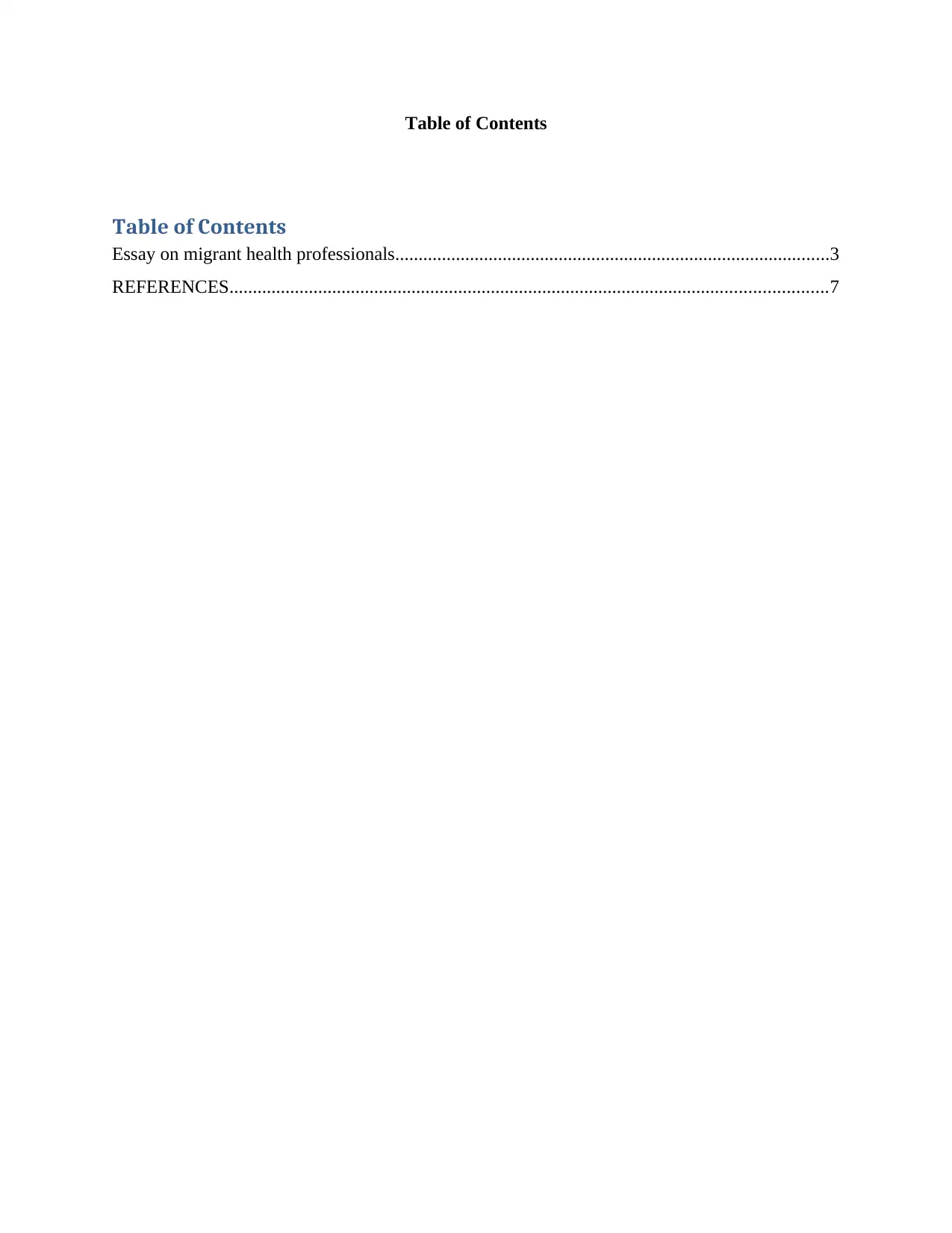
Table of Contents
Table of Contents
Essay on migrant health professionals.............................................................................................3
REFERENCES................................................................................................................................7
Table of Contents
Essay on migrant health professionals.............................................................................................3
REFERENCES................................................................................................................................7
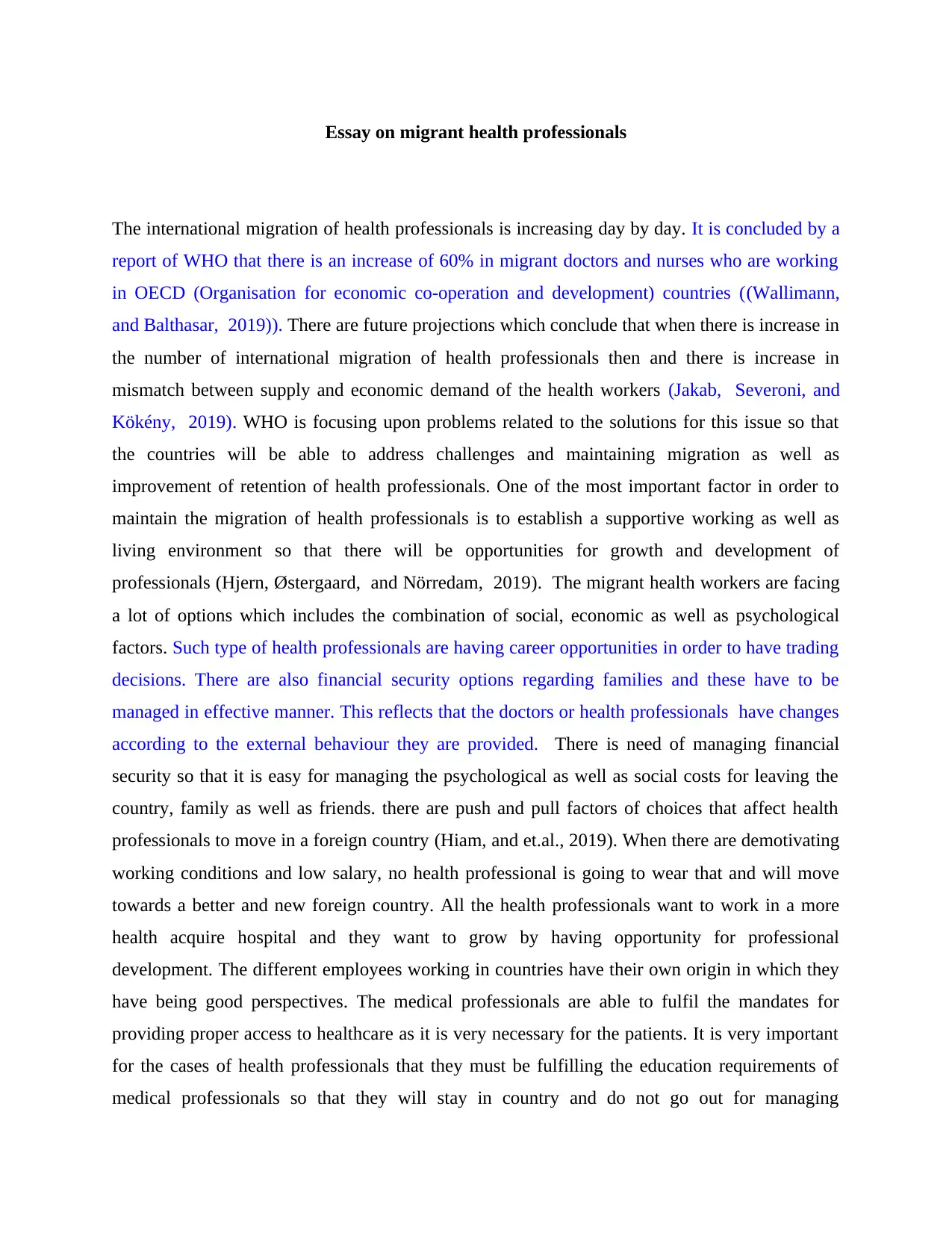
Essay on migrant health professionals
The international migration of health professionals is increasing day by day. It is concluded by a
report of WHO that there is an increase of 60% in migrant doctors and nurses who are working
in OECD (Organisation for economic co-operation and development) countries ((Wallimann,
and Balthasar, 2019)). There are future projections which conclude that when there is increase in
the number of international migration of health professionals then and there is increase in
mismatch between supply and economic demand of the health workers (Jakab, Severoni, and
Kökény, 2019). WHO is focusing upon problems related to the solutions for this issue so that
the countries will be able to address challenges and maintaining migration as well as
improvement of retention of health professionals. One of the most important factor in order to
maintain the migration of health professionals is to establish a supportive working as well as
living environment so that there will be opportunities for growth and development of
professionals (Hjern, Østergaard, and Nörredam, 2019). The migrant health workers are facing
a lot of options which includes the combination of social, economic as well as psychological
factors. Such type of health professionals are having career opportunities in order to have trading
decisions. There are also financial security options regarding families and these have to be
managed in effective manner. This reflects that the doctors or health professionals have changes
according to the external behaviour they are provided. There is need of managing financial
security so that it is easy for managing the psychological as well as social costs for leaving the
country, family as well as friends. there are push and pull factors of choices that affect health
professionals to move in a foreign country (Hiam, and et.al., 2019). When there are demotivating
working conditions and low salary, no health professional is going to wear that and will move
towards a better and new foreign country. All the health professionals want to work in a more
health acquire hospital and they want to grow by having opportunity for professional
development. The different employees working in countries have their own origin in which they
have being good perspectives. The medical professionals are able to fulfil the mandates for
providing proper access to healthcare as it is very necessary for the patients. It is very important
for the cases of health professionals that they must be fulfilling the education requirements of
medical professionals so that they will stay in country and do not go out for managing
The international migration of health professionals is increasing day by day. It is concluded by a
report of WHO that there is an increase of 60% in migrant doctors and nurses who are working
in OECD (Organisation for economic co-operation and development) countries ((Wallimann,
and Balthasar, 2019)). There are future projections which conclude that when there is increase in
the number of international migration of health professionals then and there is increase in
mismatch between supply and economic demand of the health workers (Jakab, Severoni, and
Kökény, 2019). WHO is focusing upon problems related to the solutions for this issue so that
the countries will be able to address challenges and maintaining migration as well as
improvement of retention of health professionals. One of the most important factor in order to
maintain the migration of health professionals is to establish a supportive working as well as
living environment so that there will be opportunities for growth and development of
professionals (Hjern, Østergaard, and Nörredam, 2019). The migrant health workers are facing
a lot of options which includes the combination of social, economic as well as psychological
factors. Such type of health professionals are having career opportunities in order to have trading
decisions. There are also financial security options regarding families and these have to be
managed in effective manner. This reflects that the doctors or health professionals have changes
according to the external behaviour they are provided. There is need of managing financial
security so that it is easy for managing the psychological as well as social costs for leaving the
country, family as well as friends. there are push and pull factors of choices that affect health
professionals to move in a foreign country (Hiam, and et.al., 2019). When there are demotivating
working conditions and low salary, no health professional is going to wear that and will move
towards a better and new foreign country. All the health professionals want to work in a more
health acquire hospital and they want to grow by having opportunity for professional
development. The different employees working in countries have their own origin in which they
have being good perspectives. The medical professionals are able to fulfil the mandates for
providing proper access to healthcare as it is very necessary for the patients. It is very important
for the cases of health professionals that they must be fulfilling the education requirements of
medical professionals so that they will stay in country and do not go out for managing
⊘ This is a preview!⊘
Do you want full access?
Subscribe today to unlock all pages.

Trusted by 1+ million students worldwide
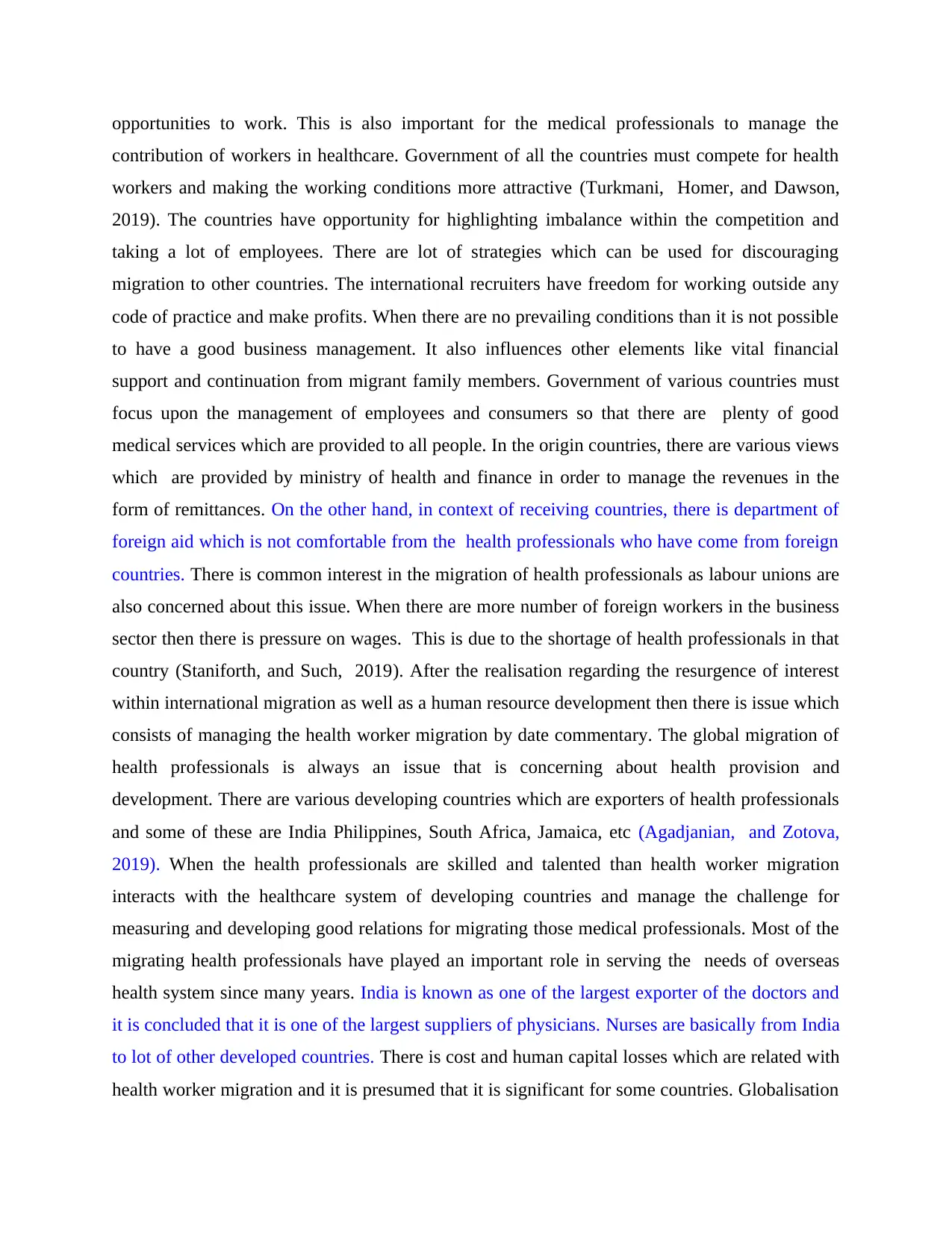
opportunities to work. This is also important for the medical professionals to manage the
contribution of workers in healthcare. Government of all the countries must compete for health
workers and making the working conditions more attractive (Turkmani, Homer, and Dawson,
2019). The countries have opportunity for highlighting imbalance within the competition and
taking a lot of employees. There are lot of strategies which can be used for discouraging
migration to other countries. The international recruiters have freedom for working outside any
code of practice and make profits. When there are no prevailing conditions than it is not possible
to have a good business management. It also influences other elements like vital financial
support and continuation from migrant family members. Government of various countries must
focus upon the management of employees and consumers so that there are plenty of good
medical services which are provided to all people. In the origin countries, there are various views
which are provided by ministry of health and finance in order to manage the revenues in the
form of remittances. On the other hand, in context of receiving countries, there is department of
foreign aid which is not comfortable from the health professionals who have come from foreign
countries. There is common interest in the migration of health professionals as labour unions are
also concerned about this issue. When there are more number of foreign workers in the business
sector then there is pressure on wages. This is due to the shortage of health professionals in that
country (Staniforth, and Such, 2019). After the realisation regarding the resurgence of interest
within international migration as well as a human resource development then there is issue which
consists of managing the health worker migration by date commentary. The global migration of
health professionals is always an issue that is concerning about health provision and
development. There are various developing countries which are exporters of health professionals
and some of these are India Philippines, South Africa, Jamaica, etc (Agadjanian, and Zotova,
2019). When the health professionals are skilled and talented than health worker migration
interacts with the healthcare system of developing countries and manage the challenge for
measuring and developing good relations for migrating those medical professionals. Most of the
migrating health professionals have played an important role in serving the needs of overseas
health system since many years. India is known as one of the largest exporter of the doctors and
it is concluded that it is one of the largest suppliers of physicians. Nurses are basically from India
to lot of other developed countries. There is cost and human capital losses which are related with
health worker migration and it is presumed that it is significant for some countries. Globalisation
contribution of workers in healthcare. Government of all the countries must compete for health
workers and making the working conditions more attractive (Turkmani, Homer, and Dawson,
2019). The countries have opportunity for highlighting imbalance within the competition and
taking a lot of employees. There are lot of strategies which can be used for discouraging
migration to other countries. The international recruiters have freedom for working outside any
code of practice and make profits. When there are no prevailing conditions than it is not possible
to have a good business management. It also influences other elements like vital financial
support and continuation from migrant family members. Government of various countries must
focus upon the management of employees and consumers so that there are plenty of good
medical services which are provided to all people. In the origin countries, there are various views
which are provided by ministry of health and finance in order to manage the revenues in the
form of remittances. On the other hand, in context of receiving countries, there is department of
foreign aid which is not comfortable from the health professionals who have come from foreign
countries. There is common interest in the migration of health professionals as labour unions are
also concerned about this issue. When there are more number of foreign workers in the business
sector then there is pressure on wages. This is due to the shortage of health professionals in that
country (Staniforth, and Such, 2019). After the realisation regarding the resurgence of interest
within international migration as well as a human resource development then there is issue which
consists of managing the health worker migration by date commentary. The global migration of
health professionals is always an issue that is concerning about health provision and
development. There are various developing countries which are exporters of health professionals
and some of these are India Philippines, South Africa, Jamaica, etc (Agadjanian, and Zotova,
2019). When the health professionals are skilled and talented than health worker migration
interacts with the healthcare system of developing countries and manage the challenge for
measuring and developing good relations for migrating those medical professionals. Most of the
migrating health professionals have played an important role in serving the needs of overseas
health system since many years. India is known as one of the largest exporter of the doctors and
it is concluded that it is one of the largest suppliers of physicians. Nurses are basically from India
to lot of other developed countries. There is cost and human capital losses which are related with
health worker migration and it is presumed that it is significant for some countries. Globalisation
Paraphrase This Document
Need a fresh take? Get an instant paraphrase of this document with our AI Paraphraser
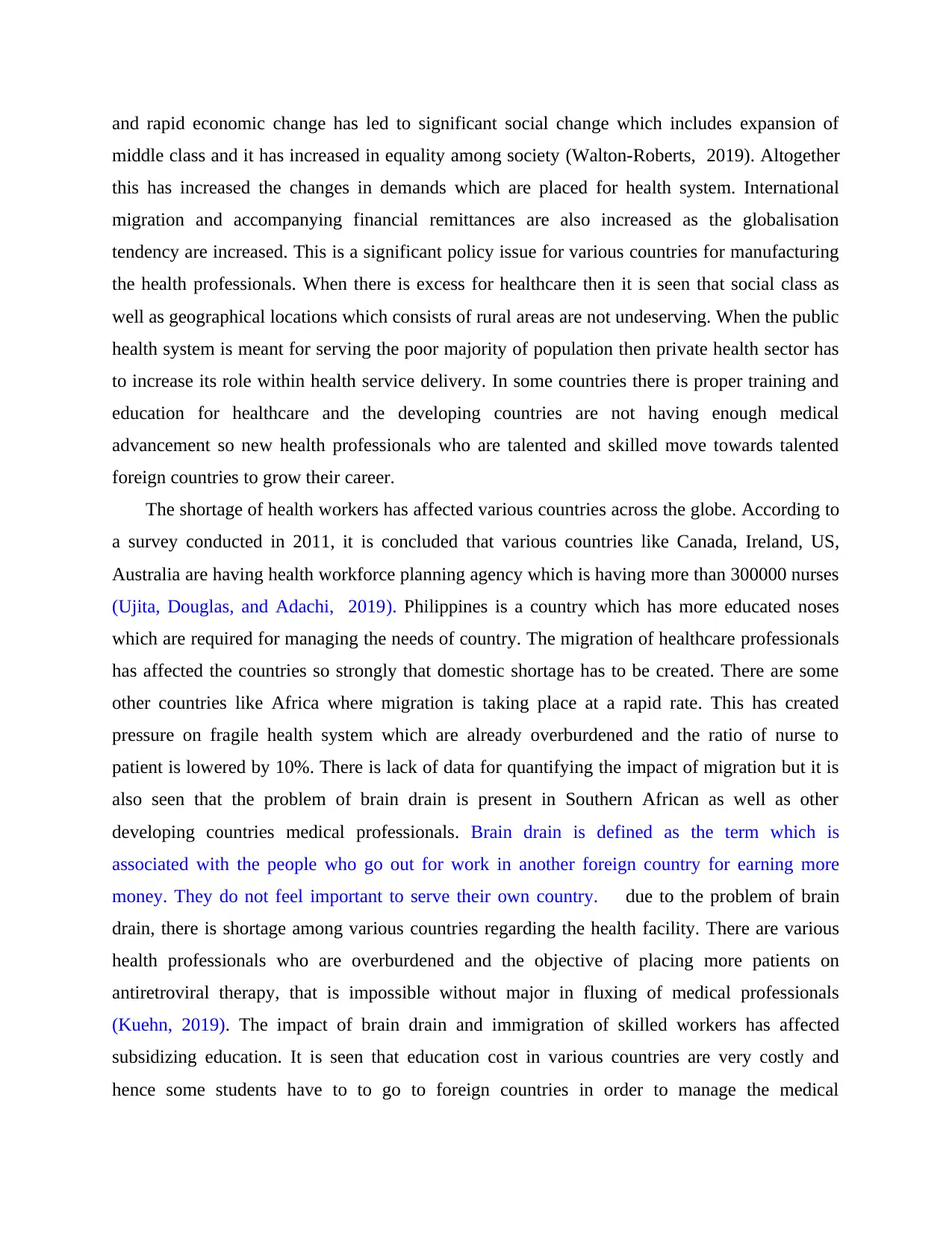
and rapid economic change has led to significant social change which includes expansion of
middle class and it has increased in equality among society (Walton-Roberts, 2019). Altogether
this has increased the changes in demands which are placed for health system. International
migration and accompanying financial remittances are also increased as the globalisation
tendency are increased. This is a significant policy issue for various countries for manufacturing
the health professionals. When there is excess for healthcare then it is seen that social class as
well as geographical locations which consists of rural areas are not undeserving. When the public
health system is meant for serving the poor majority of population then private health sector has
to increase its role within health service delivery. In some countries there is proper training and
education for healthcare and the developing countries are not having enough medical
advancement so new health professionals who are talented and skilled move towards talented
foreign countries to grow their career.
The shortage of health workers has affected various countries across the globe. According to
a survey conducted in 2011, it is concluded that various countries like Canada, Ireland, US,
Australia are having health workforce planning agency which is having more than 300000 nurses
(Ujita, Douglas, and Adachi, 2019). Philippines is a country which has more educated noses
which are required for managing the needs of country. The migration of healthcare professionals
has affected the countries so strongly that domestic shortage has to be created. There are some
other countries like Africa where migration is taking place at a rapid rate. This has created
pressure on fragile health system which are already overburdened and the ratio of nurse to
patient is lowered by 10%. There is lack of data for quantifying the impact of migration but it is
also seen that the problem of brain drain is present in Southern African as well as other
developing countries medical professionals. Brain drain is defined as the term which is
associated with the people who go out for work in another foreign country for earning more
money. They do not feel important to serve their own country. due to the problem of brain
drain, there is shortage among various countries regarding the health facility. There are various
health professionals who are overburdened and the objective of placing more patients on
antiretroviral therapy, that is impossible without major in fluxing of medical professionals
(Kuehn, 2019). The impact of brain drain and immigration of skilled workers has affected
subsidizing education. It is seen that education cost in various countries are very costly and
hence some students have to to go to foreign countries in order to manage the medical
middle class and it has increased in equality among society (Walton-Roberts, 2019). Altogether
this has increased the changes in demands which are placed for health system. International
migration and accompanying financial remittances are also increased as the globalisation
tendency are increased. This is a significant policy issue for various countries for manufacturing
the health professionals. When there is excess for healthcare then it is seen that social class as
well as geographical locations which consists of rural areas are not undeserving. When the public
health system is meant for serving the poor majority of population then private health sector has
to increase its role within health service delivery. In some countries there is proper training and
education for healthcare and the developing countries are not having enough medical
advancement so new health professionals who are talented and skilled move towards talented
foreign countries to grow their career.
The shortage of health workers has affected various countries across the globe. According to
a survey conducted in 2011, it is concluded that various countries like Canada, Ireland, US,
Australia are having health workforce planning agency which is having more than 300000 nurses
(Ujita, Douglas, and Adachi, 2019). Philippines is a country which has more educated noses
which are required for managing the needs of country. The migration of healthcare professionals
has affected the countries so strongly that domestic shortage has to be created. There are some
other countries like Africa where migration is taking place at a rapid rate. This has created
pressure on fragile health system which are already overburdened and the ratio of nurse to
patient is lowered by 10%. There is lack of data for quantifying the impact of migration but it is
also seen that the problem of brain drain is present in Southern African as well as other
developing countries medical professionals. Brain drain is defined as the term which is
associated with the people who go out for work in another foreign country for earning more
money. They do not feel important to serve their own country. due to the problem of brain
drain, there is shortage among various countries regarding the health facility. There are various
health professionals who are overburdened and the objective of placing more patients on
antiretroviral therapy, that is impossible without major in fluxing of medical professionals
(Kuehn, 2019). The impact of brain drain and immigration of skilled workers has affected
subsidizing education. It is seen that education cost in various countries are very costly and
hence some students have to to go to foreign countries in order to manage the medical
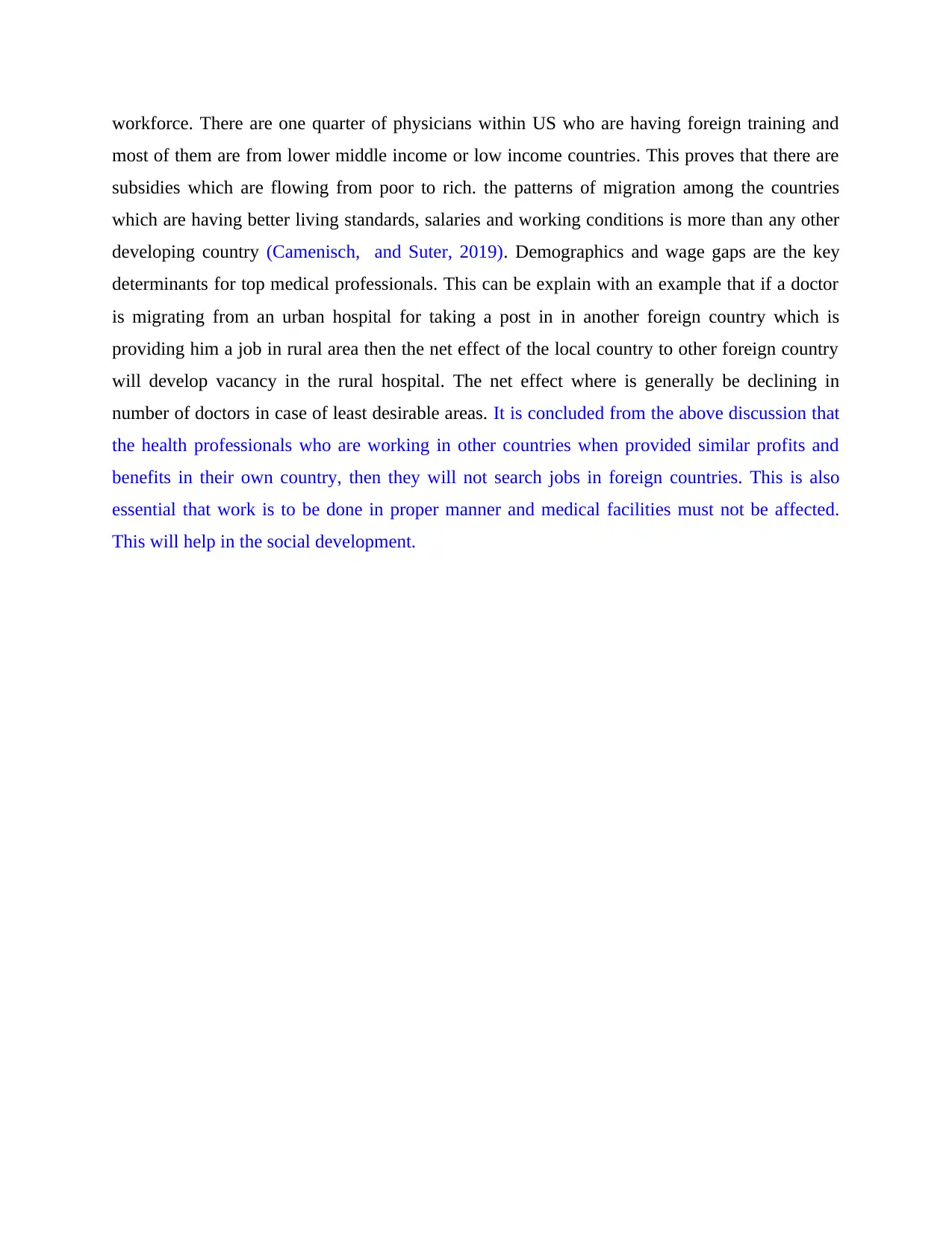
workforce. There are one quarter of physicians within US who are having foreign training and
most of them are from lower middle income or low income countries. This proves that there are
subsidies which are flowing from poor to rich. the patterns of migration among the countries
which are having better living standards, salaries and working conditions is more than any other
developing country (Camenisch, and Suter, 2019). Demographics and wage gaps are the key
determinants for top medical professionals. This can be explain with an example that if a doctor
is migrating from an urban hospital for taking a post in in another foreign country which is
providing him a job in rural area then the net effect of the local country to other foreign country
will develop vacancy in the rural hospital. The net effect where is generally be declining in
number of doctors in case of least desirable areas. It is concluded from the above discussion that
the health professionals who are working in other countries when provided similar profits and
benefits in their own country, then they will not search jobs in foreign countries. This is also
essential that work is to be done in proper manner and medical facilities must not be affected.
This will help in the social development.
most of them are from lower middle income or low income countries. This proves that there are
subsidies which are flowing from poor to rich. the patterns of migration among the countries
which are having better living standards, salaries and working conditions is more than any other
developing country (Camenisch, and Suter, 2019). Demographics and wage gaps are the key
determinants for top medical professionals. This can be explain with an example that if a doctor
is migrating from an urban hospital for taking a post in in another foreign country which is
providing him a job in rural area then the net effect of the local country to other foreign country
will develop vacancy in the rural hospital. The net effect where is generally be declining in
number of doctors in case of least desirable areas. It is concluded from the above discussion that
the health professionals who are working in other countries when provided similar profits and
benefits in their own country, then they will not search jobs in foreign countries. This is also
essential that work is to be done in proper manner and medical facilities must not be affected.
This will help in the social development.
⊘ This is a preview!⊘
Do you want full access?
Subscribe today to unlock all pages.

Trusted by 1+ million students worldwide
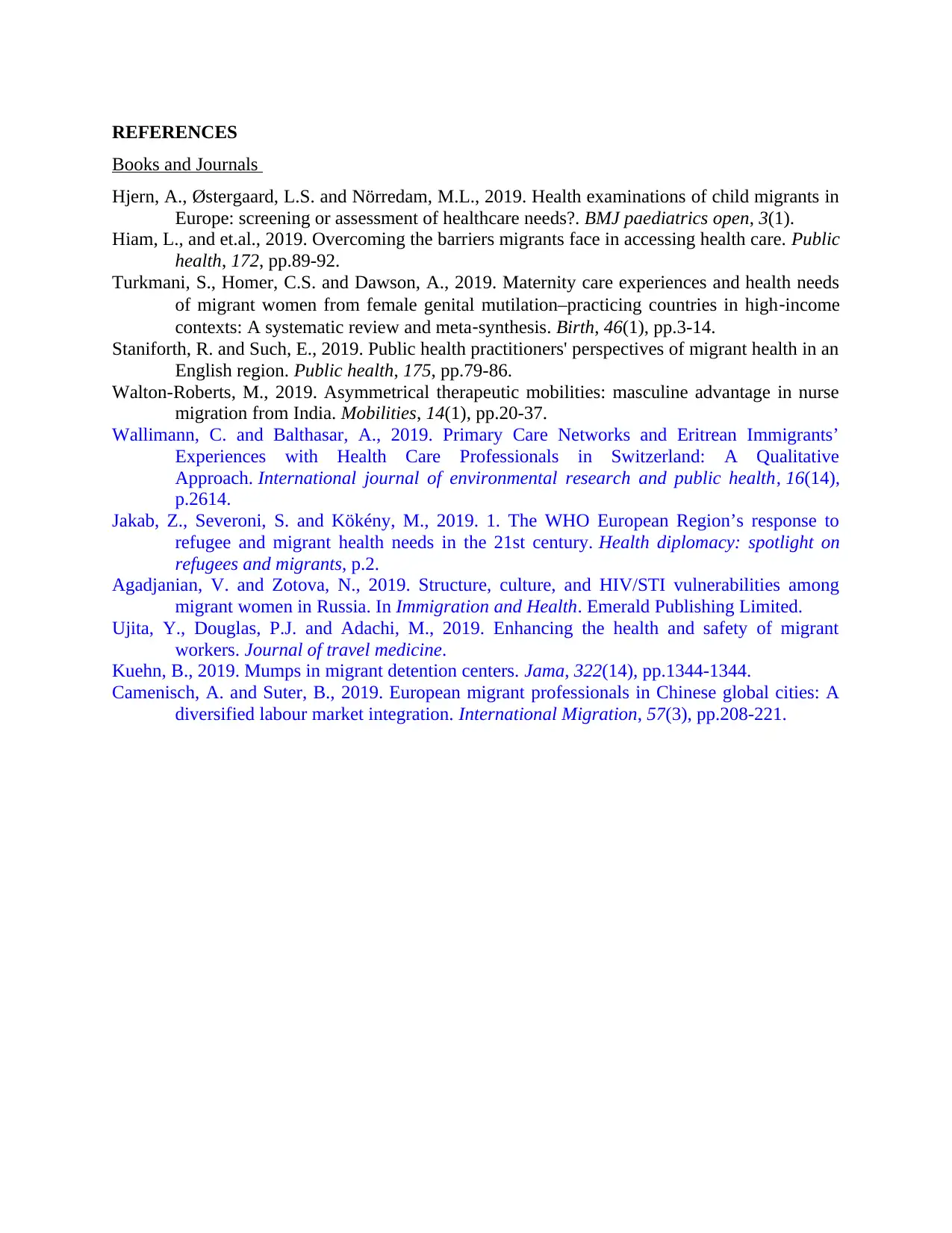
REFERENCES
Books and Journals
Hjern, A., Østergaard, L.S. and Nörredam, M.L., 2019. Health examinations of child migrants in
Europe: screening or assessment of healthcare needs?. BMJ paediatrics open, 3(1).
Hiam, L., and et.al., 2019. Overcoming the barriers migrants face in accessing health care. Public
health, 172, pp.89-92.
Turkmani, S., Homer, C.S. and Dawson, A., 2019. Maternity care experiences and health needs
of migrant women from female genital mutilation–practicing countries in high‐income
contexts: A systematic review and meta‐synthesis. Birth, 46(1), pp.3-14.
Staniforth, R. and Such, E., 2019. Public health practitioners' perspectives of migrant health in an
English region. Public health, 175, pp.79-86.
Walton-Roberts, M., 2019. Asymmetrical therapeutic mobilities: masculine advantage in nurse
migration from India. Mobilities, 14(1), pp.20-37.
Wallimann, C. and Balthasar, A., 2019. Primary Care Networks and Eritrean Immigrants’
Experiences with Health Care Professionals in Switzerland: A Qualitative
Approach. International journal of environmental research and public health, 16(14),
p.2614.
Jakab, Z., Severoni, S. and Kökény, M., 2019. 1. The WHO European Region’s response to
refugee and migrant health needs in the 21st century. Health diplomacy: spotlight on
refugees and migrants, p.2.
Agadjanian, V. and Zotova, N., 2019. Structure, culture, and HIV/STI vulnerabilities among
migrant women in Russia. In Immigration and Health. Emerald Publishing Limited.
Ujita, Y., Douglas, P.J. and Adachi, M., 2019. Enhancing the health and safety of migrant
workers. Journal of travel medicine.
Kuehn, B., 2019. Mumps in migrant detention centers. Jama, 322(14), pp.1344-1344.
Camenisch, A. and Suter, B., 2019. European migrant professionals in Chinese global cities: A
diversified labour market integration. International Migration, 57(3), pp.208-221.
Books and Journals
Hjern, A., Østergaard, L.S. and Nörredam, M.L., 2019. Health examinations of child migrants in
Europe: screening or assessment of healthcare needs?. BMJ paediatrics open, 3(1).
Hiam, L., and et.al., 2019. Overcoming the barriers migrants face in accessing health care. Public
health, 172, pp.89-92.
Turkmani, S., Homer, C.S. and Dawson, A., 2019. Maternity care experiences and health needs
of migrant women from female genital mutilation–practicing countries in high‐income
contexts: A systematic review and meta‐synthesis. Birth, 46(1), pp.3-14.
Staniforth, R. and Such, E., 2019. Public health practitioners' perspectives of migrant health in an
English region. Public health, 175, pp.79-86.
Walton-Roberts, M., 2019. Asymmetrical therapeutic mobilities: masculine advantage in nurse
migration from India. Mobilities, 14(1), pp.20-37.
Wallimann, C. and Balthasar, A., 2019. Primary Care Networks and Eritrean Immigrants’
Experiences with Health Care Professionals in Switzerland: A Qualitative
Approach. International journal of environmental research and public health, 16(14),
p.2614.
Jakab, Z., Severoni, S. and Kökény, M., 2019. 1. The WHO European Region’s response to
refugee and migrant health needs in the 21st century. Health diplomacy: spotlight on
refugees and migrants, p.2.
Agadjanian, V. and Zotova, N., 2019. Structure, culture, and HIV/STI vulnerabilities among
migrant women in Russia. In Immigration and Health. Emerald Publishing Limited.
Ujita, Y., Douglas, P.J. and Adachi, M., 2019. Enhancing the health and safety of migrant
workers. Journal of travel medicine.
Kuehn, B., 2019. Mumps in migrant detention centers. Jama, 322(14), pp.1344-1344.
Camenisch, A. and Suter, B., 2019. European migrant professionals in Chinese global cities: A
diversified labour market integration. International Migration, 57(3), pp.208-221.
1 out of 7
Related Documents
Your All-in-One AI-Powered Toolkit for Academic Success.
+13062052269
info@desklib.com
Available 24*7 on WhatsApp / Email
![[object Object]](/_next/static/media/star-bottom.7253800d.svg)
Unlock your academic potential
Copyright © 2020–2025 A2Z Services. All Rights Reserved. Developed and managed by ZUCOL.




